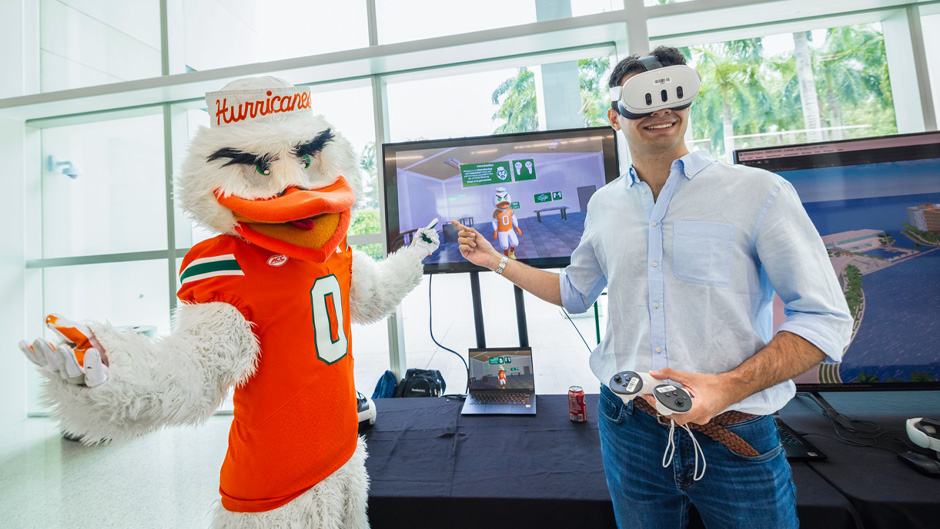Ever wondered what it’s like to run through the tunnel at Hard Rock Stadium at a Hurricanes football game? Or to participate in a glassblowing class on the Coral Gables Campus?
Students will be able to experience these and many other unique activities at the University of Miami through virtual reality headsets this semester, as part of the First Year Directions (FYD) classes.
In the past year, a group of students and staff members at the University’s UMverse initiative created an application that allows new students to experience the possibilities of VR, with the Coral Gables Campus as its main backdrop. The FYD app allows students to do things like virtually visit the Lowe Art Museum, replant coral reef fragments with Rescue a Reef, paddle through mangroves to learn about native South Florida plants and marine life, or check out a Hurricanes football, baseball, or basketball game through a 360-degree video, among many other opportunities.
“We want to introduce students to this technology and normalize the use of extended reality technology for all students at the University of Miami,” said Thomas Merrick, senior project manager of XR Initiatives and an adjunct lecturer of interactive media at the School of Communication. “In three years, we hope every student at the University has experience with XR technology, and to our knowledge, there are no other universities doing anything like this at such a large scale.”
The FYD app will be launched as an optional assignment through First Year Directions classes this fall, and students can check out one of the University’s Meta Quest 3 headsets to access it. In addition, Merrick and his team have created a training video to help students utilize the headsets and the app.
Offered to help acclimate new students to the University, First Year Directions courses are optional classes that were first piloted in 2019 with about 40 students. Since then, their popularity has grown, and the program has expanded to 84 class sections this fall with about 1,200 students currently enrolled, said Nicole Maarraoui, director of student retention.
“These classes help connect students with the University,” Maarraoui said, adding: “We are very excited about including this opportunity to experience virtual reality in FYD and hope this encourages students to take more classes that use virtual reality.”
The VR experience will be an option for new students to complete an assignment in the once-a-week class, Maarraoui added. While using the headsets is not required yet, Maarraoui and Merrick hope that many students take advantage of the FYD app this semester to pique their interest in the technology. Extended reality experiences are being integrated into more classes each year at the University, as a goal of the UMverse.
Merrick and the entire UMverse team hope that FYD students will also be part of a large research study they are conducting about using VR in the classroom. It may become one of the largest exposures ever conducted on a college campus, Merrick added.
Kim Grinfeder, director of the UMverse initiative, is also eager to see students’ reactions and the app’s impact with such a large-scale rollout of the new technology.
“The FYD VR Project will play an important role in shaping the future of education at the University of Miami, bridging the gap between traditional learning and the new world of immersive and emerging technologies,” said Grinfeder, who also chairs the Department of Interactive Media. “By integrating virtual reality into the first-year experience, we are equipping students with the tools to succeed in a rapidly advancing technological landscape.”

